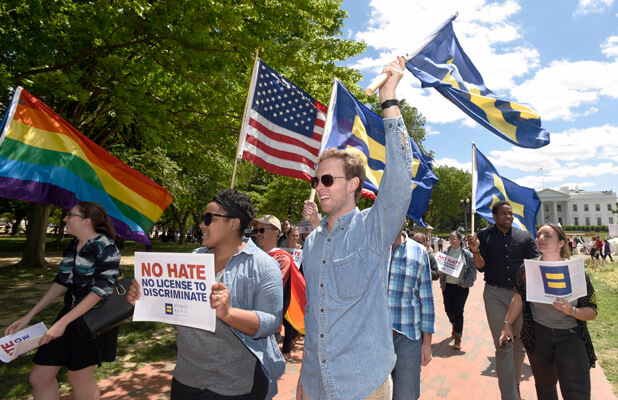Dozens of transgender women detained at the controversial Cibola County Correctional Center in New Mexico under the Trump administration’s crackdown on undocumented immigrants have been transferred elsewhere, at least for now, but the circumstances surrounding the sudden move are murky and government officials are suggesting that the women will be returned to the facility in the future.
The detention center, which is privately owned by a company called CoreCivic but still subject to control by Immigration and Customs Enforcement (ICE), has had a dedicated unit for trans women. But Cibola has been under fire in recent years following the deaths of trans women in custody there and allegations of abuse. Roxsana Hernandez, a trans asylum seeker from Honduras, died after a stint at Cibola in May of 2018 and an independent autopsy showed she suffered bruises consistent with abuse by a baton. The American Civil Liberties Union said last year that another trans woman held at Cibola, Nicole Garcia Aguilar, suffered physical and mental health issues after she was thrown in solitary confinement for extended periods of time.
Groups including Familia: Trans Queer Liberation Movement, the Santa Fe Dreamers Project, the Transgender Law Center, Trans Queer Pueblo, and the Transgender Resource Center of New Mexico placed significant pressure on ICE in response to those disturbing reports.
ICE told Gay City News in a written statement that 27 transgender women at Cibola have been transferred “temporarily” to other facilities around the nation “while ICE works with its contractor to assess and improve the quality of long-term health care management at the Cibola County Correctional Center,” suggesting that the reports of inadequate health conditions triggered the government to at least review the facility’s handling of detainees’ healthcare.
The agency would not directly respond to follow-up emails seeking a specific reason for the transfers. A spokesperson would only say that the agency “will evaluate the cases of all individuals in custody and make appropriate decisions on whether or not a transfer is necessary or advantageous for detainees considering all the factors involved with each case.”
CoreCivic told Gay City News that the company previously outsourced their healthcare coverage of detainees to third-party medical professionals, but that they would be revamping that system while the detainees are gone.
“The Cibola County Correctional Center is transitioning from a contract healthcare provider to in-house medical services,” spokesperson Ryan Gustin, manager of CoreCivic’s public affairs, said in a written statement. “Detainees with unique medical needs were transferred from Cibola County while the facility continues to work through this transition of providers.”
ICE would not respond to questions about where the detainees are located now — a spokesperson would only say that the agency “found available bed space in other facilities with existing resources to better manage the needs of certain detainees requiring continuous medical case management” — but advocates involved in the movement to protect the women in custody believe they have been moved to facilities in Tacoma, Washington, and Aurora, Colorado. Records show a Florida-based company, GEO Group, owns the ICE facilities in both Aurora and Tacoma — the Aurora Contract Detention Facility and the Tacoma Northwest Detention Center.
GEO Group has been rife with issues, as well: The company just settled for an undisclosed amount of money for pepper-spraying eight Central American asylum-seekers in retaliation for a hunger strike at one of the company’s ICE facilities in California, according to the Desert Sun.
Jorge Gutierrez, the executive director of Familia: Trans Queer Liberation Movement, an advocacy group for Latinx LGBTQ folks, told Gay City News that he has been informed that roughly 13 to 15 of the women were transferred to the Tacoma facility, while others were sent to Aurora. According to Gutierrez, the Cibola facility did not have any transgender men.
“At the Cibola facility, the trans pod is empty as far as we know,” Gutierrez said in a phone interview on February 7. “We don’t know if the trans pod at Cibola will remain empty or eventually close. We don’t know if ICE is going to open a trans pod in Aurora.”
Gutierrez stressed that advocates are now planning to focus on helping the transgender women with their legal cases and preparing community support in case any of them are released. To that end, they are contacting community-based organizations based near those detention centers in Aurora and Tacoma to inform them that the women were transferred.
The advocates are also highlighting the existing reports of women who have died in ICE custody — including at Cibola — as they try to raise awareness of the conditions at the detention centers.
“We’re going to be organizing in Colorado and Washington the week of March 9,” he added.
In the meantime, advocates will maintain the pressure on the agency to push for broader reforms.
“LGBT folks need to be released,” Gutierrez said. “Particularly trans women need to be released. The only way forward is to abolish ICE. Too many women have died.”





































